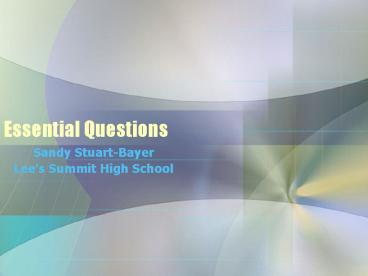Essential Questions - PowerPoint PPT Presentation
1 / 13
Title:
Essential Questions
Description:
Essential Questions Sandy Stuart-Bayer Lee s Summit High School Essential Questions Are arguable-and important to argue about. Are at the heart of the subject. – PowerPoint PPT presentation
Number of Views:146
Avg rating:3.0/5.0
Title: Essential Questions
1
Essential Questions
- Sandy Stuart-Bayer
- Lees Summit High School
2
Essential Questions
- Are arguable-and important to argue about.
- Are at the heart of the subject.
- Recur--and should recur--in professional work,
adult life, as well as in the classroom. - Raise more questionsparent questions that
produce more questions. - Often raise important issues.
- Can provide a purpose for learning.
3
Essential Questions
- Are provocative, enticing, and engagingly framed.
- Are higher-order, in Bloom's sense they are
always matters of analysis, synthesis, and
evaluative judgment. You must go beyond the
information given. - Or, in BPA terms, they are Proficient and
Advanced, never Basic. - Answers to essential questions cannot be found.
They must be invented.
4
Essential vs. leading Qs
- Leading
- Asked as a reminder, to prompt recall
- Designed to cover knowledge
- Point to a single, straightforward fact-a
rhetorical question
- Essential
- Asked to be argued
- Designed to uncover new ideas, views, lines of
argument - Set up inquiry, heading to new understandings.
5
Essential Questions
- Essential questions often begin with . .
- Why?
- Which?
- How?
- What if?
- Why do things happen the way they do?
- Which do I select?
- How could things be made better?
- Which is best?
- What if this happened?
6
Essential Questions
- Should require one of the following thought
processes - Requires developing a plan or course of action
- OR
- Requires making a decision
7
Essential Questions
- Examples
- Must a story have a moral? A beginning, middle,
and end? Heroes and villains? - Is Russia becoming more or less democratic since
Brezhnev came into power? - Is geometry more like map-making and using a map,
or inventing and playing games like chess? Were
theorems invented or discovered? - Is prejudice more a view of race or class?
- What makes a family a community?
- Do statistics always lie?
8
Essential Questions
- Examples continued
- Are some aspects of another language and culture
not understandable by people from other cultures?
- Is gravity a fact or a theory? Is evolution a
scientific law or a theory? - In what ways are animals human, and in what way
are humans animals? - Do mathematical models conceal as much as they
reveal? - (From Understanding by Design Curriculum and
Assessment, pp. 34-35)
9
Related or Supporting Questions
- These are the smaller questions that must be
answered in order to answer the big, essential
question. - They provide background and guide the work.
- They tend to be more topic and subject-specific.
10
Questioning
- For additional information on the importance of
questioning and the different types of questions
see - Jamie McKenzies Questioning Toolbox
- http//fno.org/nov97/toolkit.html or
- The Question IS the Answer
- http//fno.org/oct97/question.html or
- UnderstandingbyDesign Powerpoint
11
But my teacher wants a thesis statement. . .
- If your research assignment is required to have a
thesis statement, essential questions will help
you develop it. - Take a look at this presentation on thesis
statements from essential questions.
12
To Learn More about Thesis Statements
- Purdue OWLs Thesis or Question
- Joyce Valenzas What is a Thesis?
- Indiana Universitys How to Write a Thesis
Statement
13
Return to LSHS Research and Problem-Solving Model































